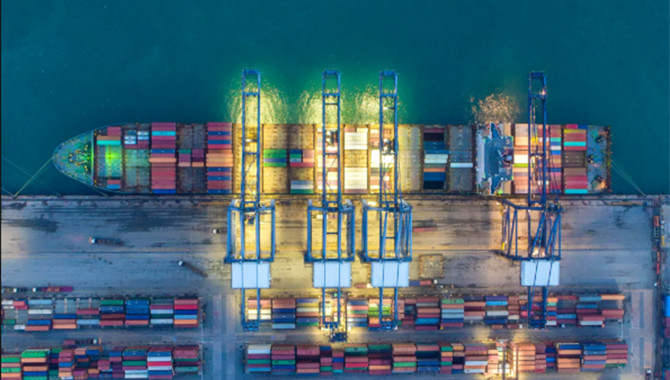Published today, the new P4G-Getting to Zero Coalition report “Shipping's Energy Transition: Strategic Opportunities in South Africa” explores the potential for South Africa to benefit from international maritime decarbonization. The report finds that South Africa, with its strong maritime connections and large renewable potential, has several promising business opportunities that could spur growth and a just transition, while accelerating decarbonization within and outside the maritime sector.
International shipping accounts for approximately 3% of global Greenhouse Gas (GHG) emissions, and this will increase in a business-as-usual scenario. To decarbonize the maritime industry, there will be a massive need for green fuels and associated technologies. In particular, scalable zero-emission fuels (SZEF) such as green hydrogen and green ammonia are considered the most promising fuels for the industry's transition.
Due to its large renewable capacity and unique location sitting at the gateway between the Atlantic and Indian Oceans, South Africa is, according to the new P4G-Getting to Zero Coalition report, well-positioned to benefit from the maritime decarbonization agenda on a both domestic and international level. The country holds the potential to accelerate the transition to cleaner forms of energy across the economy, creating several opportunities for the country.
“Harnessing the opportunities that maritime decarbonization and production of green fuels present, South Africa can assume an active role in addressing global shipping emissions while transforming national energy production, creating new jobs and ensuring long-term environmental, social and economic benefits. Acting now through concerted commitments can position South Africa as a first mover in this field,” says Margi Van Gogh, Head of Supply Chain & Transport Industries at The World Economic Forum.
Being part of the transition for shipping would allow South Africa to engage in, for example, green fuel production, exports, and bunkering; supporting a just and equitable job transition; creating green hubs and green ports; as well as allowing for green corridors along key shipping routes.
The report cites the deep-water commercial port of Saldanha Bay and Booegoebai, a proposed deep- water port project, as promising locations for bunkering and exports of SZEF. It also highlights the Hydrogen Valley, with a possible maritime component in Richard's Bay.
The lead authors of the report - Katrina Abhold, Project Lead at Global Maritime Forum and Dr. Alison Shaw, Research Associate at UCL – estimate that development of SZEF infrastructure to serve South Africa's shipping sector could attract investment up to R175 billion Rand ($11.1 billion USD) in onshore infrastructure by 2030, and with appropriate incentives and targeted action towards encouraging economy-wide energy, investment, and environmental planning, South Africa could become a first mover in this field and set an example for other countries to follow.
“Shipping decarbonization and energy transition are intrinsically linked for any country, but they are also difficult to unpick and turn into scalable and impactful opportunities and policies. By bringing together quantitative analytics on shipping and energy, understanding the policy landscape, and engaging with South Africa's stakeholder perspectives on opportunities, we hope that our efforts will help unlock South Africa's significant potential”, says Dr Santiago Suarez De La Fuente, Lecturer in Energy and Transport at UCL Energy Institute.
However, to realize this potential, the report states, there is a need for South Africa to support the development of a policy framework capable of facilitating the transition to zero-emission shipping. This would require defining national climate objectives more clearly in maritime policies, as well as supporting and advancing international policies capable of accelerating the just transition to zero- emission fuels globally.
“South Africa can play a strong role in building the global momentum towards zero-emission shipping, leveraging its own development goals while preparing to meet the future demands of the maritime industry. Unlocking international finance, establishing national and international cross-sectoral partnerships, easing financial and regulatory hurdles, and investing in climate-proof projects will be fundamental in the years to come,” says Ingrid Sidenvall Jegou, Project Director at Global Maritime Forum.
Strategic and decisive action can thus enable South Africa to become a competitive producer and exporter of SZEF, and the report concludes that investing in key-renewable energy and SZEF infrastructure would have significant benefits for the country's economy and society, reducing national emissions, improving air and water quality, creating sustainable jobs and skills expertise as part of a just transition, and developing new supply chains, creating the potential for South Africa to become Africa's first zero-carbon bunkering hub.
“South Africa has the opportunity to leverage its renewable resources to be a global leader in decarbonizing shipping. P4G is proud to support the Getting to Zero Partnership as it releases this pivotal report, which highlights how South Africa can revise its key maritime policy to align with the country's climate ambitions, accelerate economic growth, and make the maritime sector greener. By disrupting unsustainable models, this partnership is setting the stage for the future of zero-emissions shipping,” says Ian de Cruz, P4G Global Director.

 Ningbo Containerized Freight Index Weekly Commentar
Ningbo Containerized Freight Index Weekly Commentar  Ningbo Containerized Freight Index Weekly Commentar
Ningbo Containerized Freight Index Weekly Commentar  Ningbo Containerized Freight Index Weekly Commentar
Ningbo Containerized Freight Index Weekly Commentar  BIMCO Shipping Number of the Week: Bulker newbuildi
BIMCO Shipping Number of the Week: Bulker newbuildi  Ningbo Containerized Freight Index Weekly Commentar
Ningbo Containerized Freight Index Weekly Commentar  Ningbo Containerized Freight Index Weekly Commentar
Ningbo Containerized Freight Index Weekly Commentar